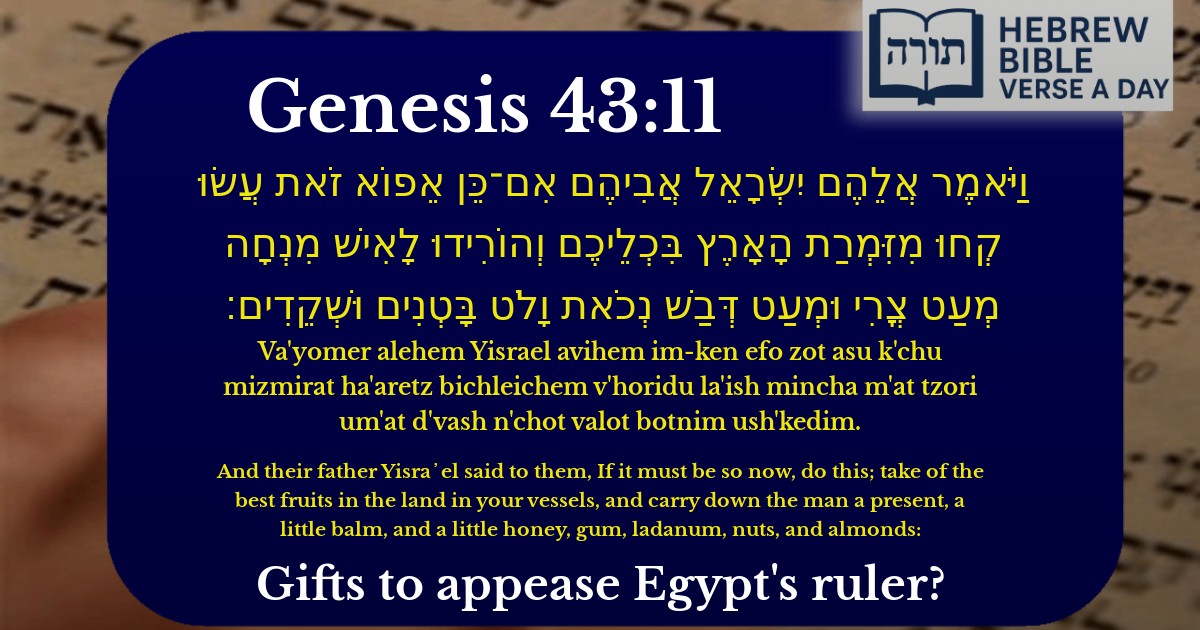Join Our Newsletter To Be Informed When New Videos Are Posted
Join the thousands of fellow Studends who rely on our videos to learn how to read the bible in Hebrew for free!
Hebrew Text
וַיֹּאמֶר אֲלֵהֶם יִשְׂרָאֵל אֲבִיהֶם אִם־כֵּן אֵפוֹא זֹאת עֲשׂוּ קְחוּ מִזִּמְרַת הָאָרֶץ בִּכְלֵיכֶם וְהוֹרִידוּ לָאִישׁ מִנְחָה מְעַט צֳרִי וּמְעַט דְּבַשׁ נְכֹאת וָלֹט בָּטְנִים וּשְׁקֵדִים׃
English Translation
And their father Yisra᾽el said to them, If it must be so now, do this; take of the best fruits in the land in your vessels, and carry down the man a present, a little balm, and a little honey, gum, ladanum, nuts, and almonds:
Transliteration
Va'yomer alehem Yisrael avihem im-ken efo zot asu k'chu mizmirat ha'aretz bichleichem v'horidu la'ish mincha m'at tzori um'at d'vash n'chot valot botnim ush'kedim.
Hebrew Leining Text
וַיֹּ֨אמֶר אֲלֵהֶ֜ם יִשְׂרָאֵ֣ל אֲבִיהֶ֗ם אִם־כֵּ֣ן <small>׀</small> אֵפוֹא֮ זֹ֣את עֲשׂוּ֒ קְח֞וּ מִזִּמְרַ֤ת הָאָ֙רֶץ֙ בִּכְלֵיכֶ֔ם וְהוֹרִ֥ידוּ לָאִ֖ישׁ מִנְחָ֑ה מְעַ֤ט צֳרִי֙ וּמְעַ֣ט דְּבַ֔שׁ נְכֹ֣את וָלֹ֔ט בׇּטְנִ֖ים וּשְׁקֵדִֽים׃
וַיֹּ֨אמֶר אֲלֵהֶ֜ם יִשְׂרָאֵ֣ל אֲבִיהֶ֗ם אִם־כֵּ֣ן ׀ אֵפוֹא֮ זֹ֣את עֲשׂוּ֒ קְח֞וּ מִזִּמְרַ֤ת הָאָ֙רֶץ֙ בִּכְלֵיכֶ֔ם וְהוֹרִ֥ידוּ לָאִ֖ישׁ מִנְחָ֑ה מְעַ֤ט צֳרִי֙ וּמְעַ֣ט דְּבַ֔שׁ נְכֹ֣את וָלֹ֔ט בׇּטְנִ֖ים וּשְׁקֵדִֽים׃
🎵 Listen to leining
Parasha Commentary
📚 Talmud Citations
This verse is not quoted in the Talmud.


Yaakov's Instructions to His Sons
The verse (Bereishit 43:11) describes Yaakov Avinu's directive to his sons to bring gifts to the Egyptian viceroy (Yosef, though they were unaware of his identity). Rashi explains that Yaakov chose these specific items because they were rare and precious products of Eretz Yisrael, demonstrating respect and a desire to appease the Egyptian ruler. The term "זמרת הארץ" (the best fruits of the land) is interpreted by Rashi as "the praise of the land"—its most excellent produce.
Significance of the Gifts
The Midrash (Bereishit Rabbah 91:11) elaborates on the symbolic meaning of each item:
Yaakov's Wisdom and Caution
The Ramban notes that Yaakov's phrasing "אם כן אפוא זאת עשו" ("If it must be so now, do this") reflects his cautious approach. He recognized the necessity of sending Binyamin but ensured they took precautions—bringing gifts to foster goodwill and minimize suspicion. The Kli Yakar adds that Yaakov sought to avoid any appearance of greed, hence the emphasis on "מעט" ("a little") of each item, showing humility.
Spiritual Lessons
The Sforno teaches that Yaakov's actions model hishtadlut (human effort within divine providence). While trusting in Hashem, he took practical steps to ensure his sons' safety. Additionally, the choice of land-based produce reinforced the connection to Eretz Yisrael, subtly affirming their identity despite being in exile.